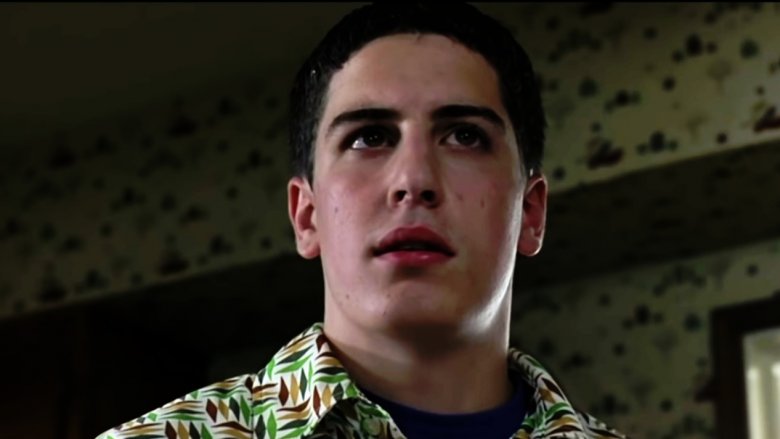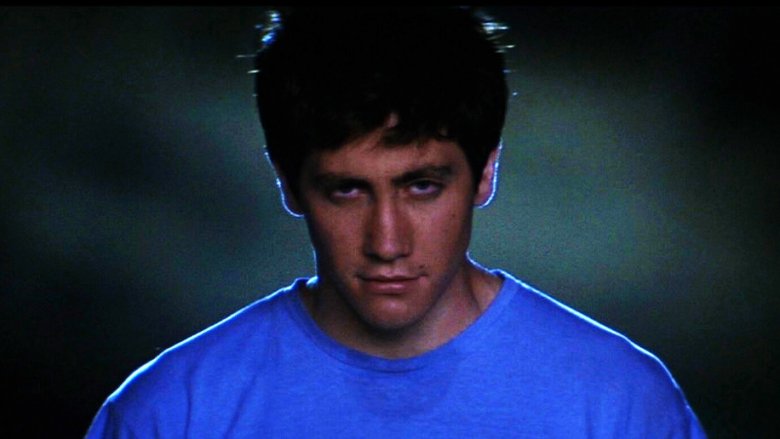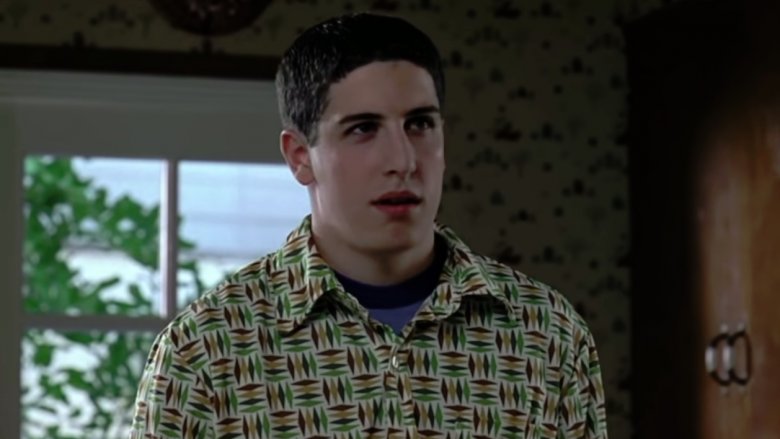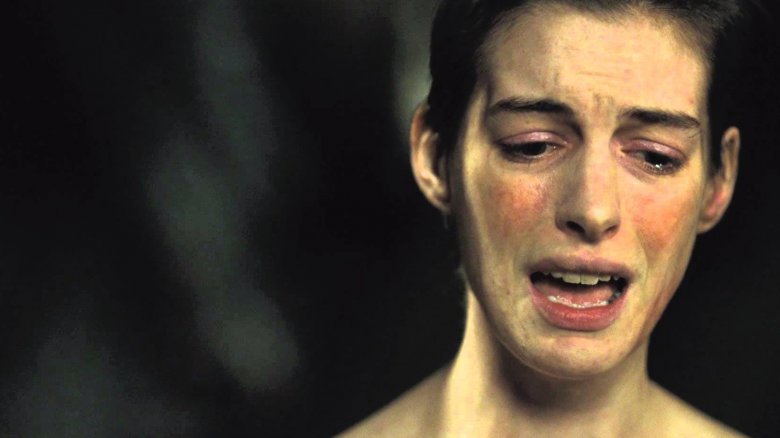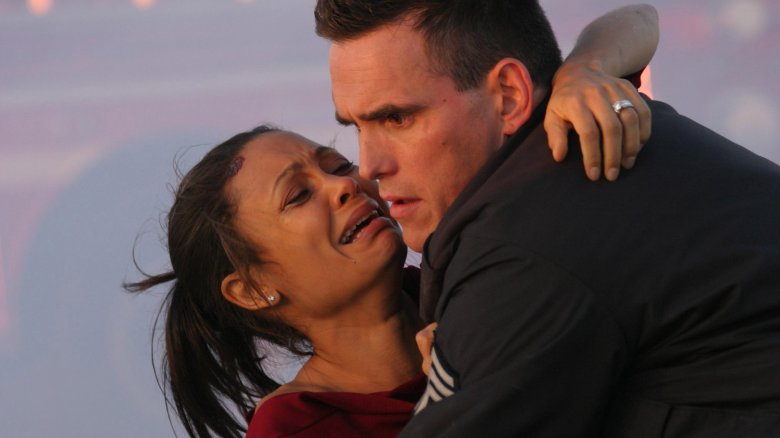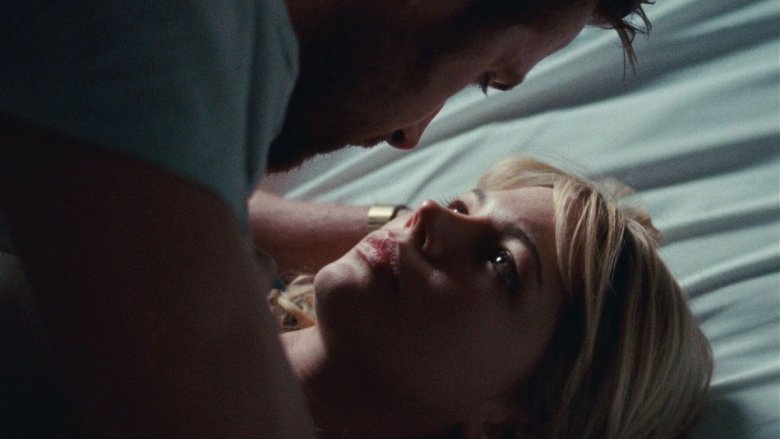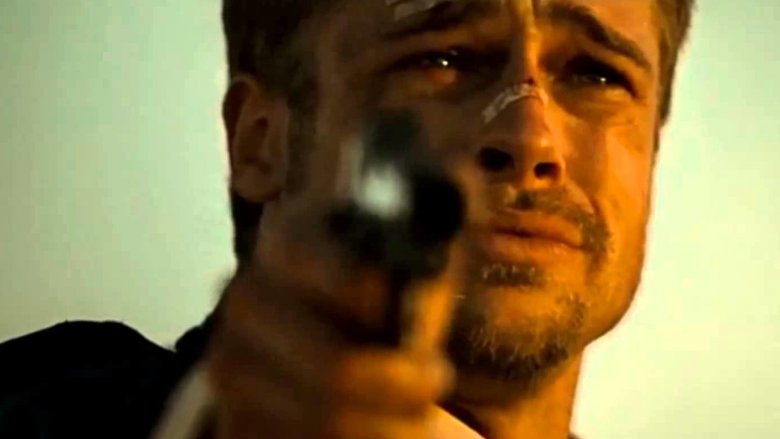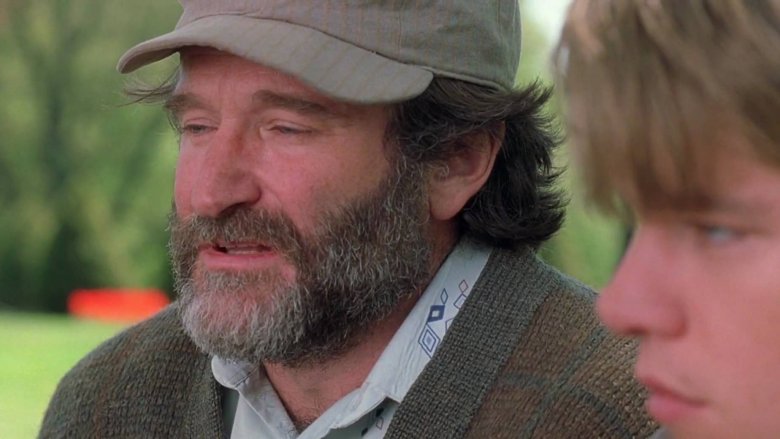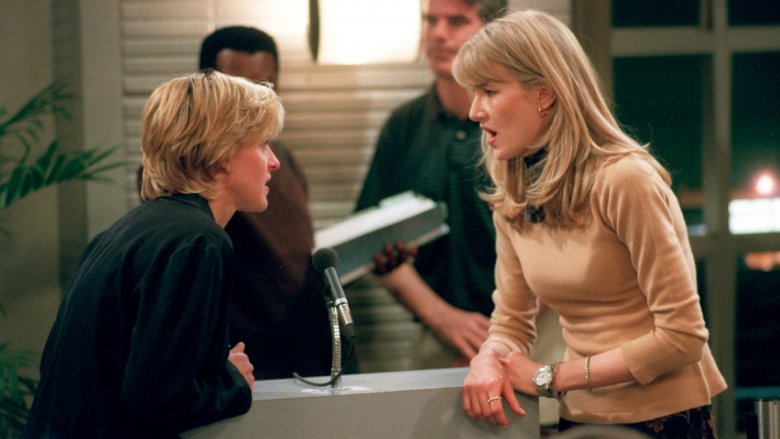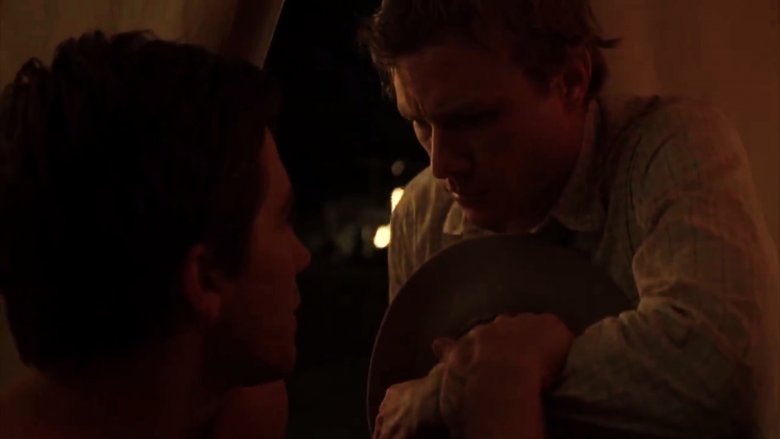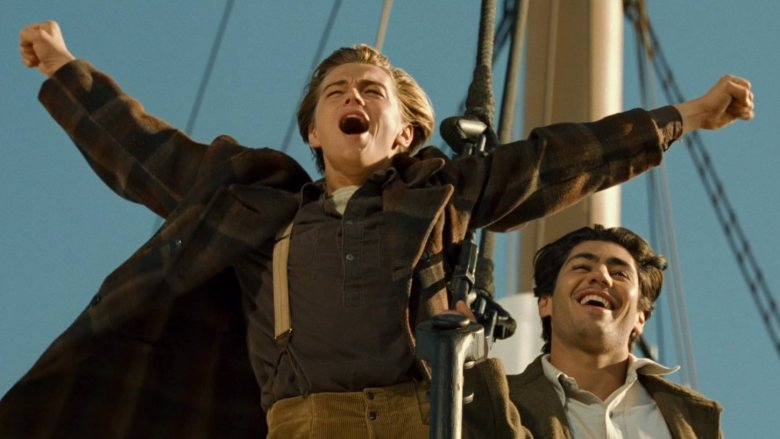Famous Scenes Actors Are Most Proud Of
Certain movie moments have a way of staying with us long after the other details of a film have faded from our memory. Often you need only mention a film's title, like E.T. the Extra-Terrestrial, for example, to see an image of children silhouetted on their bikes against a full moon. If someone brings up Jurassic Park, visions of a T-Rex in the rain come flooding back. These scenes, and many others, are a part of the modern language of movies. Certain actors are clearly quite proud to be an indelible part of renowned scenes from their famous films. We've dug deep into interviews with the stars of some of Hollywood's most famous movie scenes to find the ones they're most proud of.
And if you go chasing rabbits...
20-year-old Jake Gyllenhaal was relatively unknown when he was cast in the 2001 science-fiction mind-bender Donnie Darko. Though the film was a flop at the box office initially, it gained a cult following through midnight screenings. The first of these, at the Pioneer Theater in New York City, ran for an impressive 28 consecutive months. This led to other midnight screenings across the United States, and allowed for a much stronger showing when Donnie Darko was released in the UK.
Gyllenhaal has gone on record with his affection for the film, telling Jess Cagle in 2016, "Donnie Darko to me is one of my favorite movies I've made, and one I'm most proud of." Cagle asked which scene of that film "really resonated" with the actor, who replied, "I think the sequence where my character meets the bunny rabbit, Frank." Gyllenhaal explained that he recalled making some of his first unscripted choices as an actor while filming it, deciding he would speak to and look at the rabbit "in a particular way." He kept making that choice every time his character interacted with Frank.
Gyllenhaal called it a "weird, instinctual" thing for him character-wise that he's since learned to trust over time. The actor said he asks himself, "Why is that showing up? I'm going to use that." The first scene where he encounters Frank in Donnie Darko was the beginning of his development of that instinct.
As American as...
It launched (and then, in some cases, sank) the careers of much of its young cast. It spawned four big-screen sequels, four straight-to-video releases, and as The Atlantic put it, was part of a movement that "brought us such success stories as the Hangover movies, Superbad, Old School, and practically the entirety of Judd Apatow's film career." American Pie hit theaters in 1999 and undeniably spawned a resurgence in R-rated sex comedies. It also ensured that actor Jason Biggs will always be remembered as the curious teen who really enjoyed his mother's fresh baked apple pie. How does the actor himself feel about that legacy?
"I'm really proud of the pie scene," Biggs said in 2012. "It's become this iconic scene and I'm proud that I'm a part of it." The actor not only has no regrets about taking on the pastry-loving lead in American Pie, he feels it's defined his career. "For me at this point, those kinds of scenes, I do take a weird sort of little pride in that I've kind of become an actor that will do all those kinds of things." Biggs recalled that the scene so captured the public consciousness that it started to make him famous even before the film's release.
"It really got people talking. Before the movie even came out, people started recognizing me on the streets," Biggs told The Hollywood Reporter. "I was like, 'Man, this could really be something.'" Biggs also hinted that he'd be up for appearing in future American Pie sequels. "I love working with these people and I love playing Jim... we could do a prequel and I could play Jim's dad. I just need to get eyebrow implants or something!"
It was really more of a nightmare
She'd been a secret princess, a beleaguered fashion intern, and even Catwoman, but nothing could have prepared Anne Hathaway for the physical and mental transformation her next role would require. In the 2012 musical drama Les Misérables, Hathaway became the second woman in her family to take on the part of Fantine, an indigent factory worker who is forced into prostitution to provide for her illegitimate daughter. Hathaway's mother was the understudy for Fantine in the first national tour of the stage version of Les Misérables. Hathaway has said that starring in the filmed version has allowed her to play "the character that made [her] want to be an actress."
The scene where Fantine sings "I Dreamed a Dream" as she is dying of tuberculosis became a defining moment of the film, with Hathaway's performance hailed by critics. "Tom [Hooper] told me a few weeks before the film was finished that it would primarily be a one-take scene," Hathaway told Backstage. "I felt flattered and proud." Her pride turned to insecurity when she first saw the finished film, and she nearly avoided attending the premiere at Lincoln Center as a result. She did end up making it to the premiere, where seeing it a second time allowed her to appreciate her work. "I'm as proud of it as anything I've ever done," Hathaway said.
The negative response to Hathaway's subsequent awards for the role led her to take a break from acting. She later revealed just how dramatically the part affected her. "I felt very uncomfortable. I kind of lost my mind doing that movie and it hadn't come back yet," she said of her well-being upon receiving her Best Supporting Actress Oscar for the film. Hathaway later blamed her extreme diet and isolation for the turbulence that followed.
The rules of the road
Thandie Newton was so committed to the role of Christine Thayer in the 2004 Best Picture-winning drama Crash, she funded her own trip from London to Los Angeles to star in the film. An exploration of racial tensions through a series of interconnected stories set in L.A., Crash earned Newton a BAFTA award for best supporting actress. "I was genuinely shocked about the BAFTA," she said, "but it's great to pick up an award for something you're genuinely proud of."
"I knew that, even if I waited years and years, I'd never get a scene like the one in the car again," Newton recalled of the film's titular car crash moment. The scene sees Christine rescued from a burning car wreck by the same police officer (Matt Dillon) who sexually assaulted her just one day earlier. "It's an actor's dream to be so raw and intense and unwound," Newton explained. That scene may have convinced Newton to participate in the project, but the previous assault scene came as a shock. She initially claimed the script was misleading, but later realized she had actually misread it. "I guess I didn't want to face it," she said.
Newton remains proud of the final product. "I had to trust [writer/director] Paul Haggis," she said, "and we ended up with something that was incredibly powerful." Newton firmly believed in the director's vision, which allowed her to deliver the vulnerable performance she wanted. "He pushes things right up to the edge," said Newton, "but you know you are in the hands of someone who cares about the social, mental, and political health of people."
Their ending was far from happy
In the 2010 drama Blue Valentine, Michelle Williams and Ryan Gosling portray a married couple's enthusiastic beginning, contrasted against their later decline. Writer/director Derek Cianfrance so believed in the project that he ended up forfeiting his director's fee to get it made. Cianfrance wasn't the only one on a budget, though. He also had Williams and Gosling cohabitate for a month before filming the scenes of their marriage collapsing, and kept their lifestyle true to the meager salaries of their characters.
The reality that this preparation brought to Gosling and Williams' performances seemed to extend to its sex scenes. There's some partial nudity and brief sexual situations, and even though none of it is terribly explicit, the MPAA initially gave Blue Valentine an NC-17 rating. In a letter to the MPAA, Gosling accused the ratings board of "supporting scenes that portray women in scenarios of sexual torture and violence for entertainment purposes," but trying to ban dramatic love scenes where a woman was "complicit and complex." Williams also wrote a letter, asserting that the decision "unmasks a taboo in our culture, that an honest portrayal of a relationship is more threatening than a sensationalized one."
The MPAA did reverse the rating to an R, which allowed a limited worldwide release and earned Williams an Oscar nomination. Williams said of the scenes, which show her character on the receiving end of oral sex, "I thought, 'I've never seen that before in a movie and I'm proud to be the first. Good on us for making that happen.'" In fact, Blue Valentine wasn't the first film to feature this act, though it's one of the more high-profile examples of it.
Special delivery
"What's in the box?" That singular quote is all you need to refer to one of the most memorable movie endings of the '90s. In director David Fincher's 1995 film Seven (aka Se7en) what's in the box is the head of Detective Mills' (Brad Pitt) pregnant wife Tracy (Gwyneth Paltrow). She's been murdered by John Doe (Kevin Spacey), a sadistically creative serial killer recreating the seven deadly sins. Doe's murder of Tracy represents the sin of envy, and he successfully goads Mills into shooting him in an act of wrath, thus completing his murderous "masterpiece."
Pitt was so invested in the scene that he actually added it to his contract to ensure it wasn't cut. He'd been burned by Edward Zwick, who directed him in the 1994 drama Legends of the Fall. Zwick had ended up cutting scenes Pitt considered essential to his character. He wasn't about to let the same thing happen to Se7en.
"I had juice on Se7en. With Se7en, I said, 'I will do it on one condition — the head stays in the box,'" he told Entertainment Weekly. "Put in the contract that the head stays in the box." The actor also stood by Mills' decision to shoot Doe. "He's got to shoot the killer in the end. He doesn't do the 'right' thing, he does the thing of passion," Pitt explained, also adding it to his contract. Though the studio wanted to change the ending after some intense test screenings, the film emerged intact and Pitt was clearly proud of his work to keep it that way. "To me this is the closest I've been to a perfect film," he said.
They got benched
Good Will Hunting made stars of its co-writers Matt Damon and Ben Affleck when it hit screens in 1997, and won the pair an Academy Award for Best Original Screenplay. It also earned Robin Williams an Oscar for Best Supporting Actor. Williams played Sean, the kind of fantasy therapist only Hollywood could produce, to Damon's reluctant genius Will.
One of the film's most enduring scenes features Sean confronting Will on a park bench in front of a pond. Sean delivers a monologue that lets Will know he sees through the young man's attempts to push away therapy, the very tool that might help him make the most of his intellectual gifts. For Damon, the scene proved to him that the film he'd written had legs. "I had probably one or two lines in that," Damon recalled in 2016. "It was Robin's scene, and when he was just crushing it on the first take, I just went, 'This is gonna be really good.'" The moment resonated with Damon so much that he took his family to visit the bench years later, after Williams passed away in 2014.
It was that same scene that convinced Williams to take on the role. "What drew me to the role just was the idea of a guy trying to give back, who hadn't been practicing in a while," he recalled in 2013. "That scene by the swan boats is so kind of basic, saying, 'The only thing I have to offer you is my experience if I can help you.' That's what made it very powerful for me."
I'm coming out, I want the world to know
It's tough to ovestate the impact of Ellen DeGeneres coming out as a lesbian on her sitcom Ellen in 1997. Gallup polls showed 68% of Americans still opposed same-sex marriage at the time. "What an incredible burden to bear, to risk your career like that. People don't do that very often," remarked an emotional President Barack Obama when presenting DeGeneres with the Presidential Medal of Freedom in 2016.
"It was the hardest thing that I ever had to do in my life, and I would not change one moment of it because it led me to be exactly where I am today," DeGeneres told her studio audience at a special taping of The Ellen DeGeneres Show that celebrated the 20th anniversary of the two-part story (which was titled "The Puppy Episode" to disguise the content while in production). The 2017 special also reunited DeGeneres with actor Laura Dern, who played the object of Ellen's affection in the ground-breaking episode.
DeGeneres recalled practicing the scene where she first says the words "I'm gay" to Dern's character. "For those words to come out of my mouth for the very first time, even rehearsing it," said DeGeneres, "I would burst into tears every time." Dern also remembered DeGeneres confiding in her during filming that she'd never said the words out loud, adding, "Watching you have this catharsis and the audience support, literally holding each other up during this very emotional moment, it was so profound."
River deep, mountain high
Brokeback Mountain's loss of the 2006 Best Picture Oscar to Crash remains one of the biggest upsets in the history of the Academy Awards. Director Ang Lee's quietly powerful film about two ranch hands who fall in love during a summer job tending sheep in an isolated mountain region of Wyoming was the favorite to take the top Oscar prize. Even presenter Jack Nicholson registered shock when he announced Crash as the winner. In the intervening years, while the legacy of Crash has waned (it has been named the worst Best Picture winner of the 21st Century), the star of Brokeback Mountain continues to ascend.
Though the film continues to be lauded for its "sombre, quiet and beautifully nuanced" take on the doomed romance of its central characters, there are those who take issue with its memorable sex scene. The sudden ferocity with which Ennis (Heath Ledger) embraces Jack (Jake Gyllenhaal) still raises eyebrows, but it was one that Ledger put his whole heart into. "Now, I don't believe in Jesus," the actor told Rolling Stone in 2006, "but I believe in my performance. And if you can understand that the power of belief is one of the great tools of our time and that a lot of acting comes from it, you can do anything."
Ledger also remarked, "I guess you'd love for me to say that it was difficult," but that he was simply "kissing a human being with a soul. And part of the magic of acting is, you harness the infinite power of belief." The late actor explained, "The only anxiety I had was that the project was so perfect, I didn't want to be responsible for f***ing it up."
Come sail away
Remember Titanic Mania? The 1997 James Cameron epic swept the awards season, leading to the most-watched ceremony in Oscars history. There were Titanic-themed proms and bar nights, and fans still throw parties with some rather insensitive centerpieces. The saga of Jack (Leonardo DiCaprio), Rose (Kate Winslet), and their ill-fated four-day romance aboard the Ship of Dreams captured the attention of the world, and led to lots of merchandise aimed at the film's fans. Someone even bought the very clothes DiCaprio wore when he belted out the infamous line from the ship's bow: "I'm the king of the world!"
Cameron reported that he came up with the line just before shooting the scene, and DiCaprio first balked at saying it. "Just say, 'I'm the king of the world,'" Cameron remembered telling DiCaprio, "but you gotta sell it. He [DiCaprio] goes, 'What?' I said, 'Just f***king sell it!'"
How does DiCaprio himself feel about the famous scene? Gayle King interviewed the actor in 2014 and asked, "When you hear the Titanic song or 'I'm the king of the world,' do you start cringing?" The actor replied, "You know, it's been such a long time, but it was such... a huge part of my life. And people maybe think I have a reaction to that film. But the truth is, I'm incredibly proud of it." He and Winslet apparently still "quote the odd Titanic line" to each other, and DiCaprio even parodied that other famous moment at the bow of the ship with Jonah Hill on Saturday Night Live.
